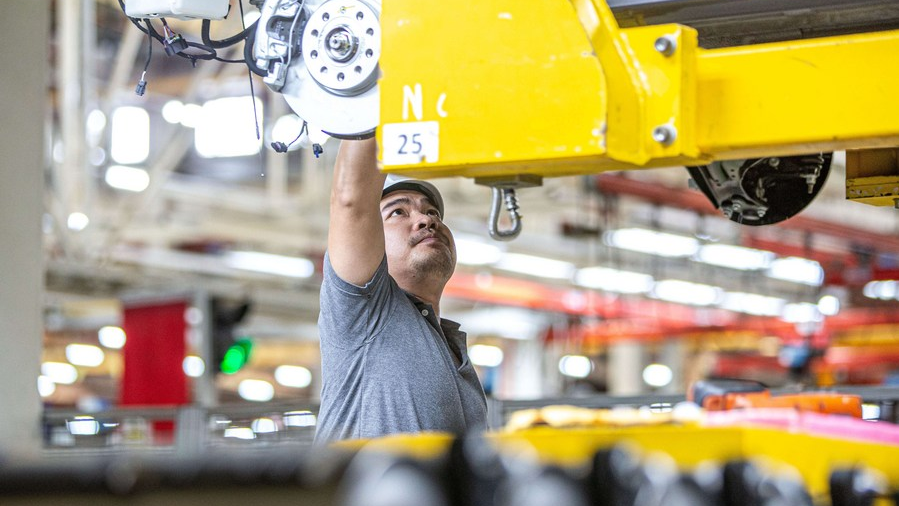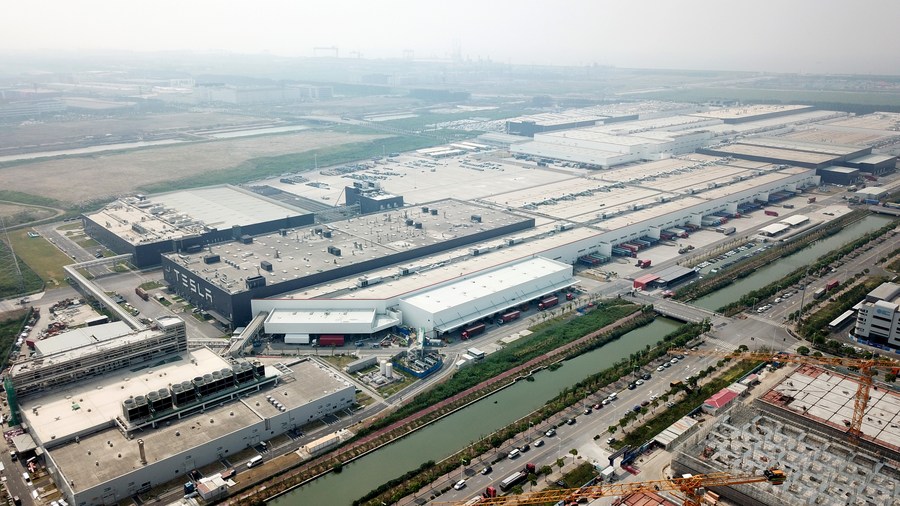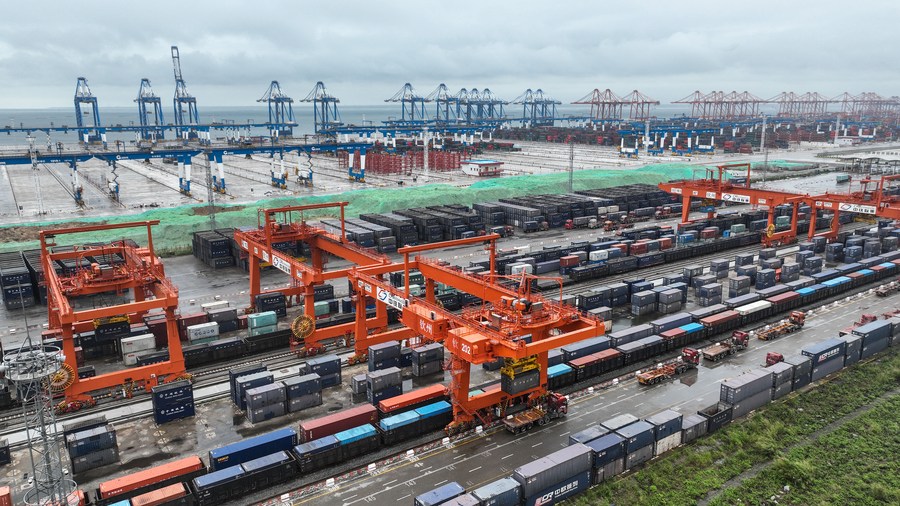
A worker works at the SAIC Motor-CP manufacturing plant in Chonburi, Thailand, September 7, 2023. /Xinhua
A worker works at the SAIC Motor-CP manufacturing plant in Chonburi, Thailand, September 7, 2023. /Xinhua
China has taken a step to remove all restrictions on foreign investment access in the manufacturing sector, underscoring its commitment to a more open and inviting business environment.
The decision was a means for China to bolster an open world economy, one of the eight major steps to promote high-quality Belt and Road Initiative (BRI) cooperation, as Xi articulated in his keynote speech at the opening ceremony of the third Belt and Road Forum for International Cooperation in Beijing on Wednesday.
The move is a vital message for all foreign investors, assuring them that they are treated equally, just like their Chinese counterparts, said Dr. Jonathan Choi Koon-shum, Chairman of Sunwah Group during an interview with CGTN.
"It is very important for free trade and investment in China," he added.
Liu Bin, a professor at China Institute for WTO Studies, University of International Business and Economics, noted that the complete removal of restrictions on foreign investment in the manufacturing sector is a significant indicator of China's increasing openness to the world.
"This move is expected to not only attract substantial foreign investment but also bolster the growth of China's manufacturing sector," Liu told CGTN.
"More importantly, it underscores China's resolve and competence in advancing its high-level opening up to a new phase," he said.
Building on its efforts to attract foreign investment, China has already eliminated or relaxed foreign equity ownership restrictions in various industries. Since 2022, all manufacturing sectors have been open to foreign investors within the pilot free trade zones (FTZs).

The Tesla Gigafactory in the China (Shanghai) Pilot Free Trade Zone, east China's Shanghai, August 20, 2022. /Xinhua
The Tesla Gigafactory in the China (Shanghai) Pilot Free Trade Zone, east China's Shanghai, August 20, 2022. /Xinhua
Seeking broader opening-up
In recent years, China has consistently increased its openness and enhanced its business environment, issuing guidelines to facilitate greater foreign access to its markets and improve the business environment.
Since 2017, China has revised its negative lists for five consecutive years. In the 2021 version of the national negative list, the number of items prohibited for foreign investors has been reduced to 31, while the negative list for pilot Free Trade Zone (FTZ) now contains 27 items.
Meanwhile, a series of opening-up measures have been introduced across various industries, including finance, automobiles, securities, banking, and vocational training, which expanded the scope for foreign investment.
China has been committed to protecting the legitimate rights and interests of foreign investors. In 2020, the Ministry of Commerce introduced rules for managing complaints from foreign-invested enterprises, aiming to enhance the foreign investment complaint system.
The rules expand the range of complaints, allowing foreign-invested enterprises and foreign investors to seek resolutions for infringements on their rights and interests. They can also make suggestions for policy improvements.
To enhance support for foreign-invested enterprises in addressing issues and streamlining the process, China has promoted digitalization through the problem-solving procedure.
Beginning in September of this year, foreign-invested enterprises can utilize the system available on the official website of the Ministry of Commerce to promptly report any problems or requests they encounter during project development and business operations.
Enterprises can track the resolution progress, identify the personnel responsible for each stage, and engage directly with the handling team to stay informed about specific progress of their issues. Once the matter is resolved, the enterprise is encouraged to share their feedback by evaluating their satisfaction with the resolution and handling process.

An aerial view of an automatic container terminal of Qinzhou Port and a railway container distribution center in Qinzhou City, south China's Guangxi Zhuang Autonomous Region, May 11, 2023. /Xinhua
An aerial view of an automatic container terminal of Qinzhou Port and a railway container distribution center in Qinzhou City, south China's Guangxi Zhuang Autonomous Region, May 11, 2023. /Xinhua
Sustained attractiveness to foreign investment
China's foreign direct investment (FDI) has experienced consistent growth over the past few years. From 2012 to 2022, China's share of global FDI increased from 8.2 percent to 14.6 percent, a report published in September by the Development Research Center of the State Council shows.
Despite the sluggish global economic recovery and the high base recorded last year, FDI in the Chinese mainland in actual use reached a total of 847.17 billion yuan (around $118 billion) in the first eight months of 2023, according to the Ministry of Commerce.
During this period, 33,154 new foreign-invested enterprises were established nationwide, marking a 33 percent year-on-year increase, which demonstrates the confidence of foreign businesses in making long-term investment in China.
China remains an attractive destination for foreign investors due to its sustained long-term economic growth that offers promising opportunities, according to Meng Wei, spokesperson of the National Development and Reform Commission.
Also, the structure of foreign capital utilization has been consistently improved. In the first half of this year, the actual use of foreign investment in high-tech manufacturing saw a significant increase of 28.8 percent year-on-year, according to data from the Ministry of Industry and Information Technology.
This development positions the high-tech manufacturing industry as a new focal point for attracting foreign investment. The extensive scope of China's manufacturing industry promises sustained profit margins for foreign-funded enterprises as well, according to the ministry.
"In the coming years, the Chinese market will remain a magnet for increased foreign investment," said Wang Yinghua, vice president and senior China advisor of Cohn Group.
"We hold an optimistic outlook for encouraging multinational enterprises to invest in China, fostering project cooperation, and achieving mutually beneficial and win-win outcomes in terms of development," he said.